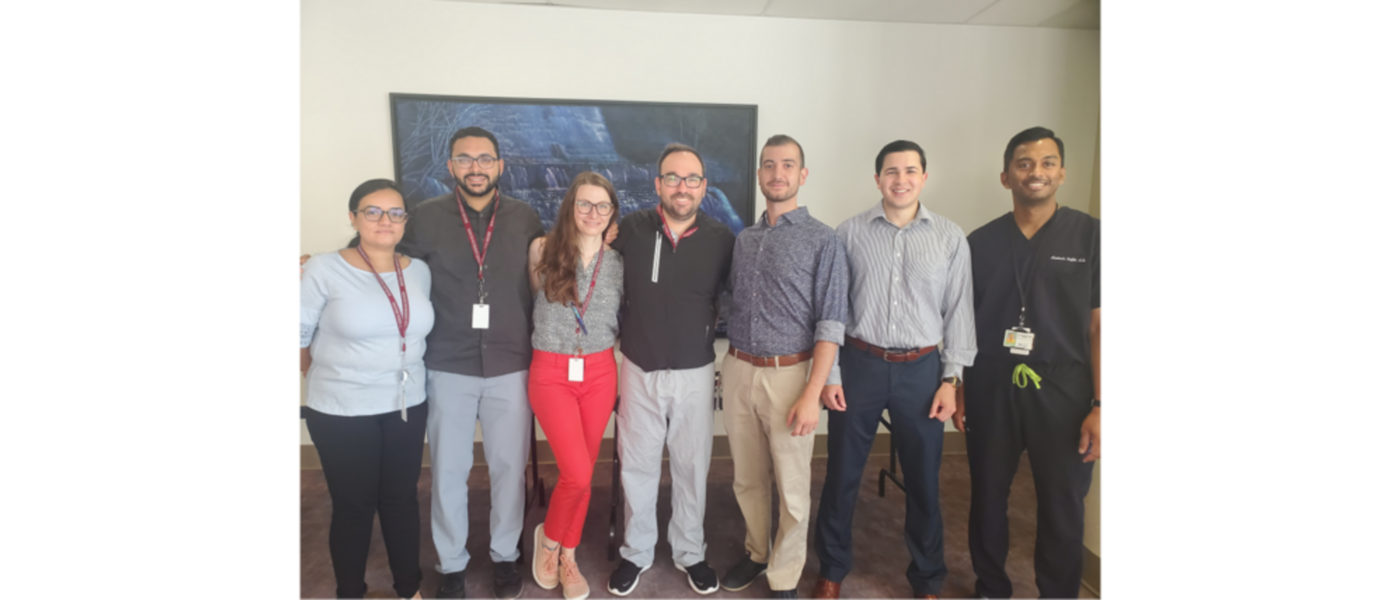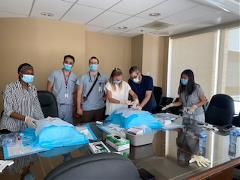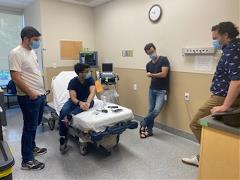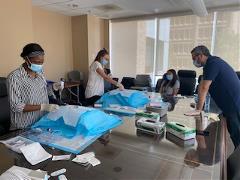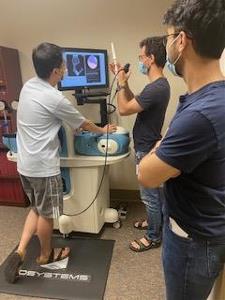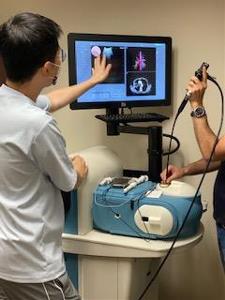RESPIROLOGY
Residency Program at McMaster
Our residency program is based at St. Joseph’s Hospital, Hamilton General Hospital, Juravinski Hospital and McMaster University Medical Centre. Each of these sites is at the forefront of medicine and has an unwavering commitment to the diverse communities we serve, to advancing healthcare through cutting-edge research and to educating the next generation of physicians. Our mission is to train outstanding Respirologists who advance our field as leaders in clinical medicine, research and education. I invite you to explore the exceptional opportunities offered by our training program.
Welcome
Our primary vision has been the delivery of knowledge, skills and scholarship to the next generation of Respirologists, who are committed to upholding the highest ethical and professional standards of medicine. Our primary mission has been to train physicians from diverse backgrounds to become leaders and agents of change in Respirology in whatever setting they choose for their career. Residents learn to provide expert, patient-centred, and evidence-based care in a variety of academic and community environments, which involves a comprehensive combination of structured clinical rotations and elective opportunities tailored to residents’ individual interests.
Education
Our Program is structured as per the Royal College’s standard where a resident assumes an increase in graded responsibilities throughout his or her training period. Early in the PGY4 year, the resident will act as Junior Consultant on the acute care service where he or she will do both consultations and oversee the junior house staff. There will be the opportunity to supervise rotating Internal Medicine residents in the ambulatory setting during the PGY5 year.
Competency frameworks such as CanMEDS form the basis of training for our medical learners. With a Competency-Based Medical Education (CBME) approach to curriculum planning that is focused on outcomes, inherently tied to the needs of patients, and involves explicit definitions of all essential domains of competence to be acquired, the rationale for CBME includes a focus on curricular outcomes, an emphasis on abilities or competencies, and a de-emphasis of time-based training. The primary instructional strategy in our current Residency Program is experiential learning, which occurs through the residents’ meaningful patient care responsibility and graduated autonomy. In preparation for the implementation of CBD, our Program developed an innovative CBME evaluation tool in order to evaluate each resident along the continuum of learning in the ambulatory clinic setting, ensuring that progression to the next level occurs at an appropriate time. Direct observation, indirect observation, chart and case reviews are some of the methods that can be used to determine if the resident has met the milestones of “learner, manager, and teacher” as they pertain to CanMEDS competencies, all of which should be mastered by the end of the two-year Program.
We have adopted a more collaborative approach to academic half-day sessions with the involvement of other specialties sharing common interests, and the inclusion of case-based learning as a strategy for expert learning would highlight some of the non-medical expert CanMEDS competencies. We have developed combined academic half-day sessions with our colleagues in Rheumatology which allows for meaningful interactions between our faculty and residents from different Medicine subspecialties. Bi-annual, combined journal club efforts with Thoracic Surgery have created a collaborative approach to learning, in addition to increasing the network of faculty involved in resident medical education. Furthermore, we developed a separate CanMEDS half-day curriculum that occurs throughout the year and involves residents from all of the Medicine Subspecialties. This has allowed for the collective instruction of non-intrinsic CanMEDS roles, which has added to our mission of creating a collaborative learning environment for our trainees.
With the introduction of CBD in 2021, it is critical that we not rest on the achievements of our current academic curriculum, but continue to scrutinize all aspects of the Program to ensure its unremitting excellence. We must, therefore, develop a strategic plan for our Program and its trainees, in line with the combined vision of our Division and McMaster University, which is the “commitment to creativity, innovation and excellence in our teaching, research and scholarship.” This plan should include a focus on resident career development and recruitment, increasing access and opportunity to engage in meaningful clinical and education-based research, improving faculty development, and introducing innovative educational tools to accommodate CBD, in line with the objectives of the Royal College of Physicians and Surgeons of Canada.
Research
The Division of Respirology boasts a solid base of clinician-investigators who are actively engaged in clinical, physiological, and health outcomes research involving the specific research themes of structure and function, immunology and environmental influence on lung health. Translational research is an exciting modality of research in the Division, often having a global impact on health care delivery for patients with both acute and chronic respiratory diseases. Our faculty has had considerable success in obtaining peer-reviewed funding, has published influential research in high-impact journals, and is recognized by leadership on national and international Respirology committees.
Developing opportunities for future and current Respirology trainees to engage in meaningful research activity is another important part of strengthening the Respirology Program moving into the future. The first step in this process would be to recognize and encourage champions within each research theme to incorporate training and education in the overall research mandate of the Division. There should be mandatory completion of a research project during the two-year fellowship program, which currently includes two months of scholarly activity in the first year of training and additional time in the second year for research activity. Research projects are rooted in the basic sciences or involve other avenues of research including clinical, quality assurance or medical education initiatives. Our Resident Research Director currently supervises all resident-related research activities, assisting residents in finding projects, aligning them with research supervisors, and helping to facilitate new funding opportunities. This helps to ensure that a high level of quality research is maintained in order to assist residents in doing research of publishable quality within the framework of their fellowship training.
Entry Requirements
Applicants would apply through the CaRMS Medicine Subspecialty Match (MSM). Full requirements can be found on their website.
Application Deadline
Please refer to the CaRMS website.
Program Overview
The implementation of Competence by Design (CBD) will consist of a soft launch in 2020-21 and the Royal College official launch in 2021-22, with the following four stages:
Transition to Discipline (TTD)
The focus of this stage is to introduce residents to the subspecialty of Adult Respirology, providing an orientation to the educational program and to the setting in which they will train and work. This stage also serves to assess and verify the competencies acquired in Internal Medicine and their application to the unique patient population served by Adult Respirology
Foundations of Discipline (F)
The focus of this stage is the development and application of the knowledge and skills needed to assess, diagnose, and manage patients with acute and chronic uncomplicated respiratory conditions and common respiratory emergencies. Residents perform and interpret Respiratory diagnostic investigations both as a clinician providing care to individual patients and as a diagnostician providing interpretation to the inter-professional team.
Core of Discipline (C)
In this stage, residents build on their achieved competencies to provide comprehensive management for any patient with a respiratory condition. They also build on previous experiences with Respiratory diagnostics modalities to add the protocoling, supervision, interpretation, and reporting of all diagnostic tests, including the use of respiratory-specific technologies. This stage introduces residents to the physician’s role in the operations of the Respirology service, including managing pulmonary function laboratory services and teaching junior learners.
Transition to Practice (TTP)
The focus of this stage is the development of the ability to comprehensively manage the work of an adult Respirologist for both an individual patient and the multiple demands of a clinic. At this stage, the resident demonstrates autonomy and takes a leadership role in the provision of respiratory services in clinical and administrative situations.
Objectives
On completion of the program, the resident will be competent to function as a consultant in Adult Respirology. Our trainees will acquire the requisite knowledge, skills and attitudes to be able to recognize, investigate, and manage adult respiratory disease. The knowledge base will include a broad appreciation of general internal medicine and the basic sciences relevant to the specialty. The professional characteristics to be demonstrated and developed include responsibility, intellectual curiosity, self-appraisal, compassion and the ability to communicate with peers and patients, and a commitment to continuing medical education. In addition, the resident must demonstrate the knowledge, skills and attitudes relating to gender, culture and ethnicity, and incorporate these into the practice of Respirology.
For the complete list of the Adult Respirology competencies provided by the Royal College of Physicians and Surgeons of Canada, please click on this link RCPSC.
For the training program, core requirements will consist of the following:
- Five rotations on the Acute Service
- One rotation ICU
- One rotation Medical Stepdown Unit (MSCCU) (Level 2 ICU)
- Two rotations Rehab / PFT / Methacholine
- One rotation X-Ray Diagnostics
- One rotation Urgent Outpatients
- One rotation Thoracic Surgery
- One rotation Scholarly Activity
- Two rotations Sleep Medicine
- Two rotations CF (includes clinics re bronchiectasis, Resp-ID, TB)
- Two rotations Subspecialty Clinics (ILD, Pulmonary Hypertension, Medical Oncology, Complex Airways Disease/Asthma)
- One rotation Interventional Pulmonology
- Six electives, one of which is Lung Transplantation in the PGY5 year at the University of Toronto
Every single rotation is four weeks in length.
A Research project is mandatory during the program under the supervision of our Research Director.

